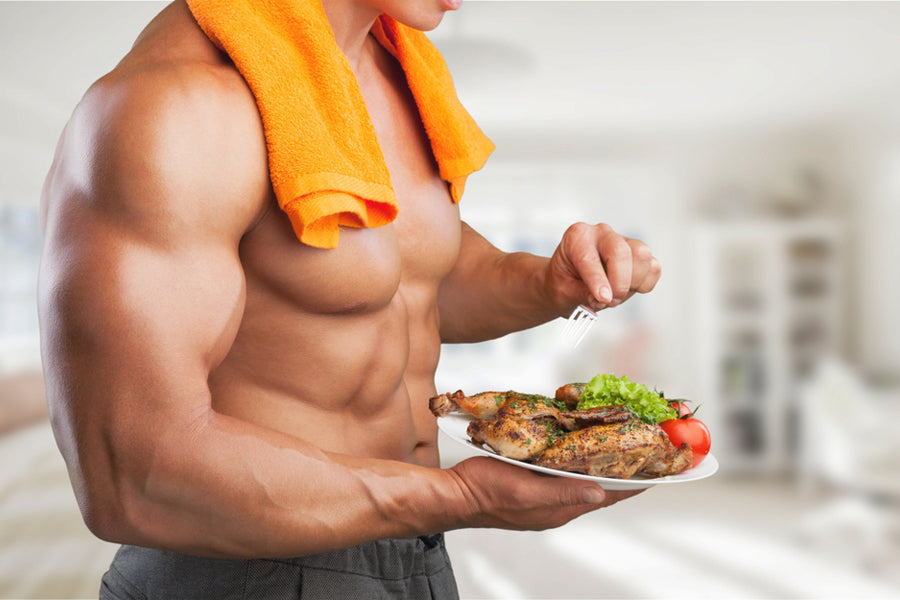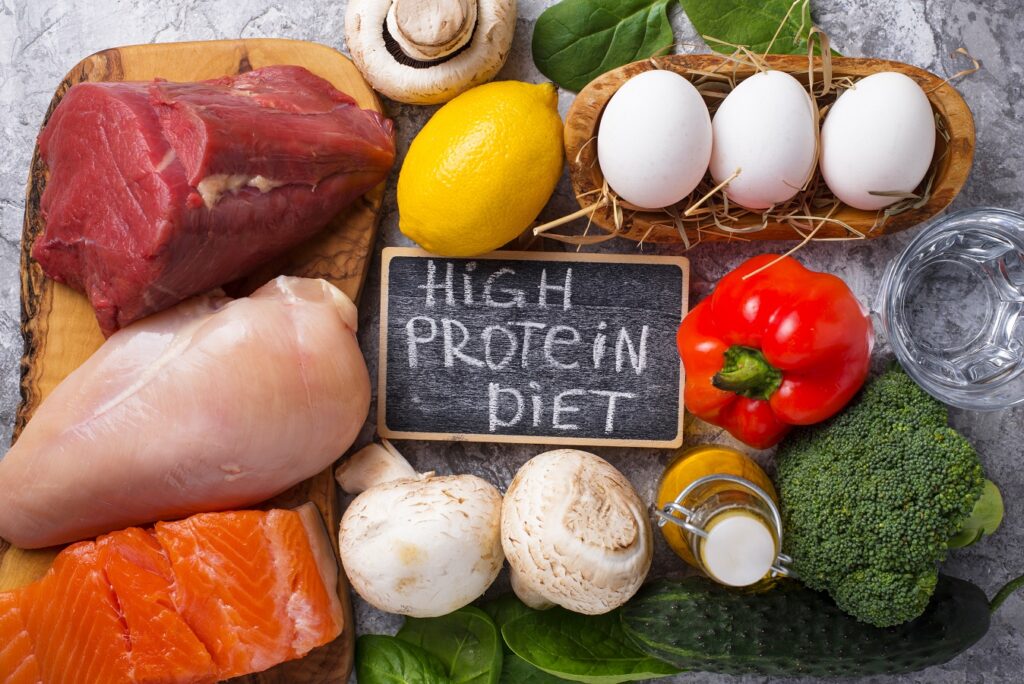Are you a bodybuilder looking to build muscle mass and improve your overall fitness? If yes, then a high-protein diet is perfect for you. A high-protein diet is characterized by consuming foods rich in protein to help meet the protein requirements of your body.
In this blog, we will explore the benefits of a high protein diet for bodybuilders, how much protein you should consume daily, and what foods you should eat to achieve your goals. We will also talk about the potential risks involved in following a high-protein diet and exercises for successful weight loss. Moreover, we will also provide tips on how you can make sure you are getting all the necessary nutrients from your high-protein diet to ensure optimal health benefits. Keep reading to learn everything you need to know about a high-protein diet for bodybuilding.
What is a High-Protein Diet?
A high-protein diet is a diet where a significant portion of the daily calories come from protein, typically around 20% or more. The Institute of Medicine recommends that protein should make up 10-35% of daily calorie intake. However, high-protein diets can exceed this recommendation, consisting of up to 50% of total calorie intake from protein. In bodybuilding, consuming more than 1 gram of protein per kilogram of body weight is considered high-protein. High-protein diets can have numerous benefits, such as managing hunger, reducing cravings, and providing the necessary protein for muscle building and recovery.

Benefits of High-Protein Diets for Bodybuilders
Protein is a vital macronutrient that is essential for muscle repair and growth. High-protein diets are incredibly beneficial for bodybuilders, as they require a lot of protein to reconstruct and strengthen their muscles. Overweight individuals can also benefit from increasing their protein intake as it aids muscle building and weight loss. A high-protein diet helps bodybuilders to achieve lean muscle growth and replenish proteins frequently. In addition to muscle building, a well-planned and nutrient-dense high-protein diet can offer numerous health benefits to bodybuilders, such as brain development, bodily functions, and satiety.
Bodybuilders require high protein diets to support muscle growth and repair. High protein diets have several benefits for bodybuilders, including:
- Muscle Growth: Protein is the building block of muscles. Consuming high amounts of protein can help to build and repair muscles, leading to increased muscle mass and strength.
- Improved Recovery: Intense workouts can cause muscle damage and inflammation. High-protein diets can help to speed up the recovery process by providing the necessary nutrients to repair damaged muscle tissue.
- Increased Metabolism: Protein requires more energy to digest and absorb than carbohydrates and fats. This leads to a temporary increase in metabolism, which can help bodybuilders to burn more calories and lose fat.
- Reduced Hunger: Protein is known to be more satiating than carbohydrates and fats. Consuming high-protein diets can help to reduce hunger and cravings, which can be beneficial for bodybuilders who need to stick to a strict diet.
- Improved Body Composition: High-protein diets can help bodybuilders to improve their body composition by increasing muscle mass and reducing body fat.
It is important to note that bodybuilders should also consume adequate amounts of carbohydrates and fats in their diet to support their training and overall health. Additionally, it is recommended to consult with a registered dietitian or healthcare professional before making any significant changes to your diet.
How Much Protein Should You Consume for Bodybuilding?
The amount of protein recommended for bodybuilding varies depending on factors such as age, fitness level, and body composition goals. The recommended daily intake typically ranges from 1.6–2.2 g/kg/day of protein per kilogram of body weight. Overweight or obese individuals may require a lower protein intake, while elite athletes may consume up to 2g/kg daily to support muscle growth.
During the first 12 weeks of a workout program, higher protein intake is recommended to aid in muscle fiber breakdown and the creation of new structures.
Bodybuilding diets often include a high protein intake and strict limits on ultra-processed food, but their overall healthfulness varies. It is important to remember that protein should not be the sole focus of a bodybuilder’s diet, and maintaining a balanced diet is crucial for overall health and wellness.

What Foods Should You Eat on a High-Protein Diet for Bodybuilding?
Incorporating foods rich in protein is essential for bodybuilders as protein makes up 60-70% of all protein in your muscles. A high-protein diet is crucial for bodybuilding as protein helps build and repair muscle tissues. Here are some foods you should consider including in your diet:
- Lean meats: Beef, chicken, turkey, and pork are great sources of high-quality protein.
- Fish: Fish, such as salmon, tuna, and tilapia, are excellent sources of protein and omega-3 fatty acids.
- Eggs: Whole eggs or egg whites are excellent sources of protein and are easy to prepare.
- Dairy: Milk, cheese, and yogurt are great sources of protein and also provide calcium and other essential nutrients.
- Legumes: Beans, lentils, and chickpeas are high in protein and are also rich in fiber and other nutrients.
- Nuts and seeds: Almonds, peanuts, pumpkin seeds, and sunflower seeds are high in protein and healthy fats.
- Grains: Quinoa, brown rice, and oats are excellent sources of complex carbohydrates and protein.
It’s also essential to ensure that you’re getting enough protein throughout the day to support muscle growth and repair. Generally, a high-protein diet for bodybuilding should include approximately 1-1.5 grams of protein per pound of body weight. However, it’s best to consult with a registered dietitian or a sports nutritionist to create a personalized diet plan that meets your specific needs and goals.
Are There Any Risks Involved in Following a High-Protein Diet?
While high-protein diets have benefits for bodybuilders and may help improve blood glucose control in diabetics, there are risks involved in following such a diet. A high-protein diet that exceeds 2 gram per kilogram of body weight daily can lead to negative health effects like high blood pressure and heart disease.
A diet in which 20% of total calories come from protein is considered a high-protein diet, which is about 100 grams of protein for a 2000 calorie diet. As with any diet, consultation with a doctor and getting regular check-ups is important, especially if you have pre-existing kidney issues. However, high-protein diets can prevent osteoporosis, are beneficial for overweight individuals, and can lower blood pressure.

Tips for Successful Weight Loss with a High-Protein Diet
To get started on a high-protein diet plan, you need to keep track of your macronutrient intake and stick to your calorie goals.
- Determine Your Daily Protein Needs: Protein needs vary depending on age, gender, activity level, and muscle mass. As a general guideline, aim for 1.2-1.6 grams of protein per kilogram of body weight per day.
- Incorporate Lean Proteins: Choose lean sources of protein such as chicken, fish, turkey, tofu, beans, and lentils. These foods are low in fat and calories but high in protein, which can help you feel full and satisfied.
- Increase Your Fiber Intake: High-protein diets can be low in fiber, which can lead to constipation and other digestive issues. Make sure to include plenty of fiber-rich foods such as fruits, vegetables, whole grains, and nuts to keep things moving smoothly.
- Watch Your Portions: Even healthy foods can lead to weight gain if you eat too much of them. Use measuring cups or a food scale to keep portions in check, and aim to fill half your plate with non-starchy vegetables.
- Exercise Regularly: Exercise is important for weight loss and overall health. Aim for at least 30 minutes of moderate-intensity exercise most days of the week.
- Avoid Processed Foods: Processed foods are often high in calories, fat, and sodium, and low in nutrients. Stick to whole, nutrient-dense foods as much as possible.
- Seek Professional Advice: Before starting any new diet or exercise program, consult with your doctor or a registered dietitian to ensure that it is safe and appropriate for you.
Expect to spend two weeks adapting to the new meal plan and be open to making changes based on how your body is responding.
Finally, supplementing with branched-chain amino acids can help you increase muscle growth and weight loss.
How to Make Sure You’re Getting Enough Nutrients on a High-Protein Diet?
A high-protein diet can be an effective way to lose weight, build muscle, and improve overall health. However, it’s important to ensure that you’re still getting all the necessary nutrients while following this type of diet. Here are some tips to make sure you’re getting enough nutrients on a high-protein diet:
- Include a variety of protein sources: Don’t rely solely on one type of protein source, such as meat or dairy. Make sure to include a variety of protein sources, such as beans, nuts, seeds, tofu, and seafood. This will help ensure that you’re getting all the essential amino acids and other nutrients that are found in different types of protein.
- Eat plenty of fruits and vegetables: Fruits and vegetables are packed with essential vitamins, minerals, and fiber, which are all important for overall health. Make sure to include plenty of colorful fruits and vegetables in your meals to get a wide variety of nutrients.
- Choose whole grains: Whole grains such as brown rice, quinoa, and whole wheat bread are a good source of carbohydrates and fiber, and they also provide important nutrients such as B vitamins and minerals like iron and magnesium.
- Consider a multivitamin: While it’s always best to get your nutrients from whole foods, it can be challenging to get all the nutrients you need from your diet alone. Consider taking a multivitamin to fill any nutrient gaps and ensure that you’re meeting your daily requirements.
- Stay hydrated: Drinking enough water is important for overall health and can also help you feel full and satisfied. Aim for at least 8 cups of water per day, and more if you’re exercising or in a hot climate.
- Monitor your intake: Keep track of what you’re eating to ensure that you’re getting enough nutrients. You can use a food diary app or consult with a registered dietitian to help ensure that your high-protein diet is meeting your nutritional needs.
A high-protein diet comprises 20% or more of daily calories from protein, exceeding 1 gram per kilogram of body weight.
Overdoing high-protein diets can lead to health issues. Therefore, it is essential to follow the recommended daily intake based on age, weight, and gender. It is vital to track the intake of carbohydrates and fats on a high-protein diet to ensure a healthy balance.

How do you know how much protein you need for bodybuilding?
Protein needs for bodybuilding can vary based on factors such as age, fitness level, and goals. However, a general guideline is to aim for at least one gram of protein per pound of body weight. Adequate protein is crucial for building and maintaining muscle, post-workout recovery, and overall immune system support.
A bodybuilder may require 2-3 grams of protein per kilogram of body weight daily. However, meeting this goal through a regular diet can be challenging. Incorporating high-protein foods like chicken, fish, and tofu can help you reach your daily protein intake.
Consuming 200g of protein per day may not necessarily be too much, but consuming excessive amounts of protein can be inefficiently used by the body, and may cause concern for the kidneys. There is no scientific evidence supporting the consumption of 400g of protein per day. Most bodybuilders spread their protein intake throughout the day, and elite athletes consume around 2g of protein per kg of body weight every day to pack on muscle.
For adults, the National Academy of Medicine recommends a minimum of 0.8 grams of protein per kg of body weight per day, with a range of 10%-35% of calories from protein. After the initial 12 weeks of a new workout routine, it is recommended to scale back protein intake to between 1.2g and 1.6g per kilo.
People May Also Ask For
- Is high protein diet good for bodybuilders?
Yes, a high protein diet is essential for bodybuilders. As muscles are composed of protein, consuming adequate amounts of protein is crucial for muscle growth and repair. Additionally, protein can help manage hunger and promote muscle strength.
For effective weight loss, overweight individuals should also consider adding more protein to their diet. It is recommended that elite athletes who want to pack on muscle consume 2g of protein per kg of body weight daily.
- What foods do bodybuilders avoid?
Bodybuilders typically avoid sugary, deep-fried, and ultra-processed foods. They also limit alcohol consumption to maximize their gym results. Instead, bodybuilders stick to nutrient-rich foods high in protein, accompanied by veggies and fiber-rich foods. Fried and processed foods are rare in their diets.
Let’s Sum Up
If you’re a bodybuilder, integrating more high-protein foods into your diet can provide you with a host of benefits, including an increase in muscle mass, more energy, and better recovery time. But you must remember to mix your protein sources, as well as to consume other nutrients in the right amount. One of the most important things to remember is that a high-protein diet should be coupled with consistent strength training to make the most of its potential.



